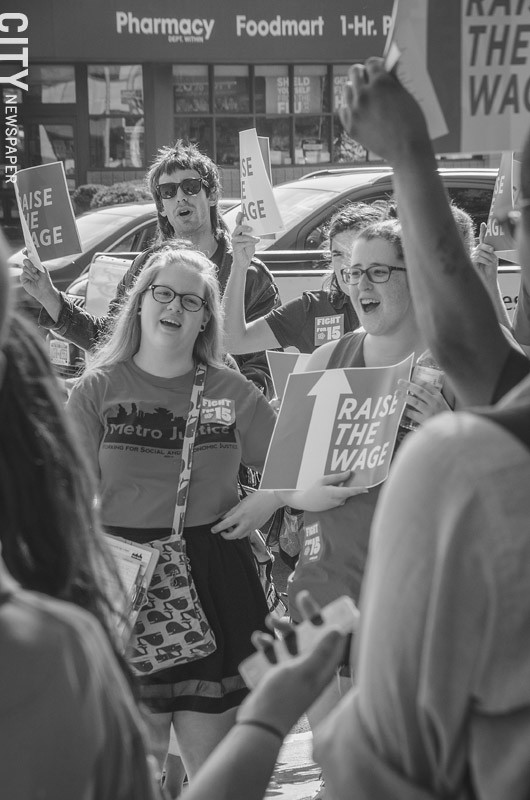
[
{
"name": "500x250 Ad",
"insertPoint": "5",
"component": "15667920",
"parentWrapperClass": "",
"requiredCountToDisplay": "1"
}
]
Metro Justice is at a reckoning point.
The Rochester area's most prominent progressive organization began in 1965 to support FIGHT, a group of black clergy and activists formed to address unemployment, housing, schools, and other issues facing black inner-city residents. Friends of FIGHT, as Metro Justice was first called, broadened its mission over the years and has become an effective activist group, recently joining in the fight for a $15 minimum wage in New York and working on campaigns against institutional racism in city schools and the criminal justice system.
But Metro Justice faced a test of its core values earlier this year, when three women approached its leaders with complaints against Colin O'Malley, its organizing director since 2011. Two of the women accused O'Malley of sexual misconduct, and the third alleged that he'd been emotionally abusive during their relationship, according to a statement that Metro Justice's Council e-mailed to the organization's members in September.
The women approached Metro Justice leaders in April, and a committee of Council members began an investigation into their allegations. The full Council held a preliminary vote in June to see which of a range of disciplinary options its members might back. The vote showed support for suspending O'Malley and allowing him to return to work after meeting some specific conditions, including counseling. But a week after the straw vote, O'Malley resigned, a decision that "reflected his desire not to be a source of continued conflict within the organization," according to the statement Metro Justice sent to its members.
Council's indication that it was willing to let O'Malley return, however, set off a controversy that its leaders continue to deal with.
The alleged abuses took place between 2002 and 2013, according to the statement Metro Justice sent its members. None of the women who made them are or were Metro Justice employees or volunteers, but some of the allegations coincide with time that O'Malley served as the organization's top staff member.
Irene Morrison, who now lives in Tacoma, Washington, alleges that O'Malley sexually assaulted her in January 2013 when she was living in Buffalo. The incident, which involved alcohol, started as consensual but became non-consensual, she says.
One of the other women, who requested that CITY withhold her name, dated O'Malley around 2009; she lived in Buffalo and then Rochester during the time of their relationship, but no longer lives in the area. She alleges that O'Malley was emotionally abusive and that he threatened to hit her. She says she provided the Metro Justice investigators with a recording she made of an incident where O'Malley was "berating me and putting me down."
CITY was unable to speak to the third woman about her complaint.
As Metro Justice was investigating the women's accusations, it brought several other people into the process to talk about their own experiences with O'Malley. One of them was Katharina Jackson, a former Metro Justice volunteer, who alleged that O'Malley was emotionally abusive when she was dating him casually for six months. In particular, she says, he engaged in "lots of gaslighting," a form of psychological manipulation in which one person makes another person constantly question what's real or true.
The Council's current president, Aaron Micheau, says that the investigation and discussion about a response was "a difficult process to go through."
"This was the first time that we'd done anything of this magnitude," he said in an interview last week, "and we, in a lot of cases, had to figure stuff out as we were doing it."
Metro Justice leaders wouldn't disclose the breakdown of the straw vote, but of its 13-member Council, three people who favored firing O'Malley resigned. Among them was Abby Comstock-Gay Güner, who at the time was the Council's vice president and who had served on the three-person committee that led the investigation. Güner says she quit specifically because of that preliminary vote.
The women who approached Metro Justice leaders with the allegations were also upset with the outcome. They ultimately wanted O'Malley removed from his job, which is a position of power within the Rochester activist community. The Council's decision to suspend O'Malley but allow him to return if he met certain conditions shows that the Council didn't believe them, they say.
They also say Metro Justice leaders were reluctant to issue a public statement acknowledging the allegations, outlining the investigation process, explaining Council's decision, and laying out steps to improve operational policies. The leaders had promised to publicly issue a statement like that, they say.
Metro Justice ultimately did issue a statement to its members in September. But the conflict spilled out onto social media during Brett Kavanaugh's Supreme Court confirmation hearings, which began September 4. Several women had accused Kavanaugh of sexually assaulting them during his high school or college years, and the allegations were a central focus of the hearings.
Referencing those hearings and allegations, Katharina Jackson wrote a September 29 Facebook post criticizing the Metro Justice Council for allowing O'Malley to keep his job and charging that the organization's leaders didn't listen to the women's testimony or prioritize their experiences.
And on October 4, the Council responded in a public Facebook post, which directly referenced Jackson's post without naming her. Council argued that the women were believed, defended its process, and said Jackson's post was divisive.
Council's response wasn't well received.
"Metro Justice should either fold as an organization or be completely overhauled with new leadership that doesn't enable inexcusable behavior," Morrison wrote in a statement she provided to CITY following the Metro Justice post. "These past few months have been incredibly difficult for my mental health and I have so many times felt that I should have said nothing, that I should have continued to suffer in silence. This supposedly feminist organization would certainly have preferred it if I had."
A lengthy stream of comments on the Council post sharply criticized its tone and message, which the commenters saw as either dismissive or an exercise in victim-blaming. Many of the comments came from members of Rochester's activist left community, and they made it clear that the organization had lost their trust.
Since then, at least a couple of organizations have distanced themselves from Metro Justice.
"The October 4th statement was intended to address what we felt were misrepresentations about our process, but was harmful in both tone and message," Council President Aaron Micheau wrote in a response to questions from CITY. "That statement was issued without input from key leaders in the organization. For that and any harm caused, we apologize."
The statement had reflected input only from Council and did not include volunteer leaders from within the organization, Micheau said in a subsequent interview, during which Evelyn Evans, the Council's secretary and interim vice president was also present.
Metro Justice leaders maintain that they took the women's testimony seriously. The investigation was "premised on the conclusion that the three women were telling the truth," and the accounts from the women, O'Malley, and eight "witnesses" provided detail and context for Council to consider when making its decision, Micheau wrote in his response to CITY.
"All of Council sought to impose some level of sanction upon Colin, which would not have been the case if the women hadn't been believed," Micheau wrote.
Güner, the former Council vice president, says she never saw any reluctance to believe the women, at least as far as the people most involved in the process were concerned. The investigators took the accusations seriously, she says.
"Unfortunately, it is the case that the outcome is kind of the message," Güner says.
And that was a message she didn't want to be part of, she says. Güner was planning to move away from Rochester at the end of the summer anyway, but she quit Council earlier than she intended to.
"I felt that this was something that was serious enough that for ethical and political reasons our response should be a termination of employment," Güner says.
O'Malley provided a lengthy statement to CITY in which he directly addressed most of the allegations against him. "During my investigation with Metro Justice," he wrote, "I didn't deny the accusations and my understanding is that my statements line up closely with the statements of the accusers." (O'Malley said he didn't have enough details about Jackson's allegations to respond in any meaningful way, since she wasn't interviewed as a victim in the Metro Justice process.)
Council leaders say they wanted a deliberative process where the women would be heard but that was also fair to O'Malley. And they wanted to build the process around principles of restorative justice.
Micheau and Evans said that meant considering not just the harm caused by O'Malley, but his efforts past and present to acknowledge that harm, to make sincere attempts at reconciliation, to get counseling, and to change problematic behaviors.
O'Malley and some of the witnesses on his behalf spelled out those efforts to the investigating committee, Council said in the Facebook post. And in his written statement to CITY, O'Malley summarized the efforts.
He spoke with and apologized to two of the three women "regarding these situations" before the accusations were taken to Metro Justice, he said. The third woman asked not to speak with him further, asked that he seek counseling for anger management, and asked that he "disclose my serious problems in conflict with future partners so that they can identify problematic patterns in advance for themselves," he wrote. He also said that he's followed through with those requests.
His current partner was already aware of these accusations when they were brought to Metro Justice, O'Malley wrote. They spent time discussing them before and during their relationship, he wrote.
In the time since the women took their allegations to Metro Justice, O'Malley wrote, he's "taken the time to further and intensify my efforts at harm-reduction, self-growth and just relationships."
He's evaluating his past relationships for behavior that may have hurt people who may not have raised concerns but "are also deserving of apologies and offers at reconciliation," he wrote.
He's "reading and studying themes of affirmative consent, harm reduction and reconciliation," he wrote. He's "watching for the various ways that consent manifests itself in everyday life and trying to practice being more caring and conscientious," he writes.
Also, he's resumed counseling and is working to understand his "own history of abuse and trauma and the cycle of shame that it can create that leads to further harm," he writes.
In his statement, he said he acknowledges that the work should have been more vigorous, and he said he wishes he'd sought support in doing that sooner. The work begins with himself, he said, and addressing some of his "personal demons will be lifelong work." His progress, he said, hasn't always been "linear or ideal."
"I constantly regret the harm that I have caused these women," O'Malley wrote in his statement for CITY. "I wish that I could reverse these actions. It is hard to live the reality that I cannot undo this harm. What I can do is continue to acknowledge the damage I have caused and do what I can to learn and grow so that I don't repeatedly hurt others in my life."
He also wrote that "many will not trust that it's possible." And the three women with whom CITY spoke are definitely skeptical. They all said that O'Malley made past attempts at change and reconciliation after some of their experiences, but before others. They don't think things would be any different this time, they say.
The allegations against O'Malley and the way Metro Justice handled them raise several questions.
One is a question that Metro Justice leaders themselves struggled with with: How should a social justice organization that believes people can change for the better – that people who cause harm are not beyond redemption – handle serious accusations against a key staff member? And does it make a difference when those accusations conflict with several of the organization's core ideals?
"People were really, really grappling with this and figuring out how to do the best thing for everyone, and the right thing and the moral thing," Güner says.
Evans says the process was about making sure the women were heard, but Council also "needed to look at all sides of that picture" through a deliberate and fair process that ended in a democratic decision.
Even then, there's the question of how to hold someone accountable without acting in a purely punitive manner.
There's also the question of Metro Justice's reputation and relationships, and the extent to which either has been damaged by the investigation process and its outcome. Throughout the investigation and after O'Malley's resignation, Metro Justice staff and volunteers continued working on some crucial campaigns. Currently, the organization is active in a statewide push for single-payer health care and is working with a coalition of groups on bail reform and other issues related to mass incarceration.
To be effective, Metro Justice needs to mobilize other activists and community members. A few groups have distanced themselves from the organization, though, and its leaders want to earn back their trust.
"Communication is always the key," Evans says.
Metro Justice leaders have said that they welcome dialogue about the O'Malley process and that they've been seeking out conversations within and outside of the organization.
In the e-mail to its members, the Council says it is "strongly encouraging discussion or suggestions concerning structural or organizational improvements that will help us to create a supportive and welcoming environment for staff and volunteers."
Some people outside of Metro Justice have suggested the idea of an ombud, a liaison who would assist people with complaints about an employee or the organization. Micheau and Evans say Council is creating that position, which will likely be held by a long-time member of Metro Justice.
The Metro Justice Council has also created a new reporting structure within the organization so that if Council members, staff, or volunteers learn of problems, they know where to take that information, Micheau says.
The organization's annual meeting is coming up on Saturday, January 26, and at that time members can vote on new by-laws and Council candidates, among other things. Whether the controversy around O'Malley is a factor remains to be seen. But it's not unheard of for a member-based nonprofit's board to go through some turnover in elections following a controversy.
"While I obviously didn't agree with the outcome of this and resigned over it, I still think that there's a lot of work that Metro Justice is doing that's really, really important," Güner says. "And especially among staff, I think people are doing really, really great work and are working very hard to move beyond this."
This article has been updated to correct a person's name.
Speaking of...
-

Six art shows you shouldn’t miss this fall
Sep 1, 2021 -

Activists want federal funds for climate, social justice initiatives
Aug 20, 2021 -

Calendar preview: A Season for Change
Sep 10, 2020 - More »



